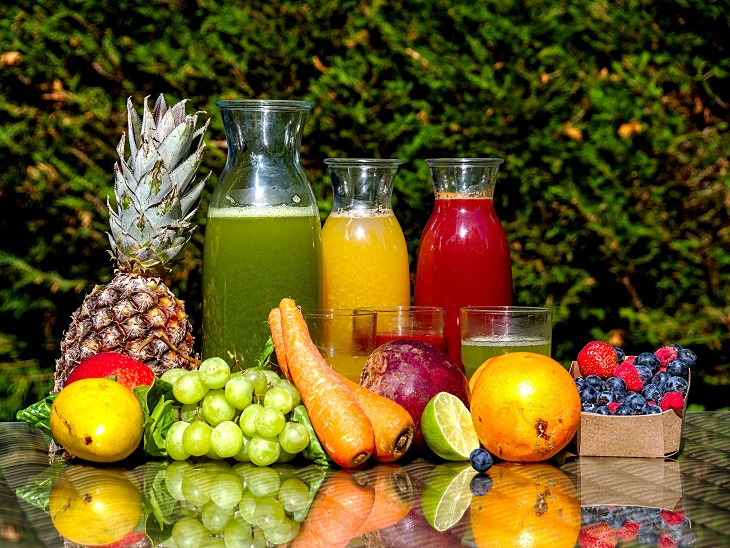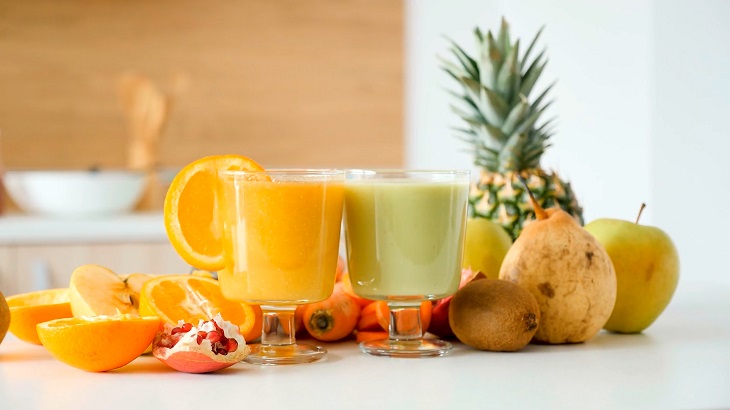THE DAILY DOSE
What Does “Detoxing” Actually Mean?

Detox diets have become mainstream in recent years because of all the promises they make in regards to improving overall health. Various claims include getting rid of harmful toxins from the body, cleaning the blood, and even helping to jumpstart weight loss. Detox diets are also purported to aid in the healing process of many health issues including digestive diseases, autoimmune disease, allergies, bloating, obesity, chronic fatigue, and inflammation.
The jury is still out on the detox diet because of a lack of clinical research. The detox diet studies that do exist are also flawed in nature, so it’s uncertain whether these diets work or if the people who have done them and claimed to feel better afterward were experiencing a sort of placebo effect. There are various types of detox diets, all of which offer the same claims of improved health. Read on for all you need to know, including the answer to the important question: what does “detoxing” actually mean?
What does detoxing mean?
The word “detox” essentially means to get rid of unhealthy or toxic substances. Typically, detoxing used to be a process reserved for people who had been exposed to toxic chemicals or substances such as illicit drugs. Nowadays, though, detoxing is often used in the health space as a way to rid people’s bodies of harmful substances through a variety of methods.
The most common detox method is fasting; other common methods include limited diets where you only consume fruits, vegetables, or fruit juices and water. In some cases, a detox diet may involve use of supplements or colon cleanses/enemas to flush waste from the system.
The way detox diets are said to work is by giving the organs time to rest while stimulating the liver to detox more efficiently. They are also said to improve circulation and ensure that healthy nutrients are being reintroduced into the body.

What kind of detoxes are there?
Although all detox diets are said to have similar benefits as well as the same end goal, there are various ways a person can participate in a detox diet. They include:
- Fasting: The fasting that is done in a detox diet typically occurs for as little as one day up to as many as three days.
- Fresh fruit and vegetables: Many detoxes focus solely on consuming fresh fruit and vegetables in juice form. Smoothies, water, and tea can also be consumed while on this type of detox diet.
- Drinking specific liquids: Other than fruit juices or smoothies, some detox diets instruct people to drink only one type of special liquid, such as salted water or lemon juice.
- Elimination: Elimination detox diets aim to remove things that may cause issues with a person’s health, such as foods that contain heavy metals, allergens, or other contaminants. Other things that are commonly eliminated during detox diets include alcohol, coffee, cigarettes, and refined sugar.
- Supplementation: In some cases, people may have to take herbs or other supplements during a detox to help reintroduce healthy substances into the body.
- Getting rid of waste: A big part of a many detox diets is getting rid of waste. This is often achieved through the use of laxatives, colon cleanses, or enemas.
- Exercise: During a detox diet, emphasis is often placed on having a regular exercise routine.
The length of time a detox diet lasts and how intense it is will vary depending on the person and their goals.
Is a detox the same as a cleanse?
Both detox diets and cleanses follow the same sort of routine; however, cleanses are more focused on digestive health, whereas detoxes are likely to take the approach of aiding the body generally by removing toxins.
There are a few areas where some research has found detoxing to be of benefit. They include:
- Weight loss
- The avoidance of dietary sources of heavy metals
- More exercise, which is better for overall health
- The introduction of healthier foods into the diet
- Avoiding heavily processed foods that are bad for the body
- Drinking more water or tea and being more hydrated
- Limiting stress levels, which can help improve sleep
With that being said, if you were to follow certain elements of a detox diet such as focusing on whole and nutritious foods, eating more fruits and vegetables, drinking more water, and exercising regularly, you would likely see similar benefits – simply because these elements are part of a well-rounded and healthy lifestyle regardless of whether you are detoxing or not.

Should I detox my body?
While detoxing is a personal choice, the body has its own detoxification process that gets rid of toxic substances all on its own, so you really don’t have to participate in one at all. Your body is constantly making sure it has no buildup of harmful substances. The natural detox process is done by the liver and through the excretion of feces, urine, and sweat. The liver itself actually manages to take toxic substances and make them harmless, and then sends them out of the body.
While detoxing may be beneficial in some ways, it does not take a special diet to get rid of harmful toxins from your body. Your liver and other processes do this for you already. The idea of a detox diet, however, can be helpful in changing your lifestyle in a way that helps you prevent illness and the consumption of certain substances such as heavy metals or alcohol. If you do choose to detox, it’s important that you speak to your doctor first to ensure that your body can withstand the potential effects of your chosen detox diet.
Featured image by Гоар Авдалян on Unsplash